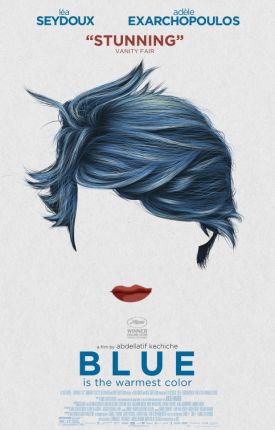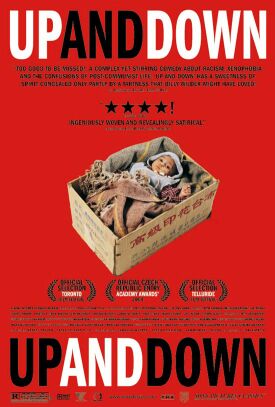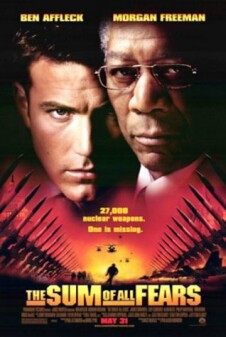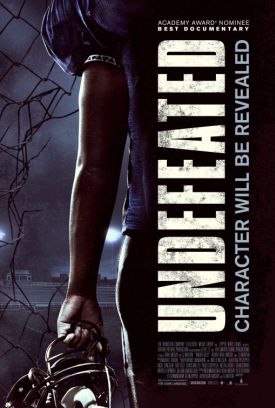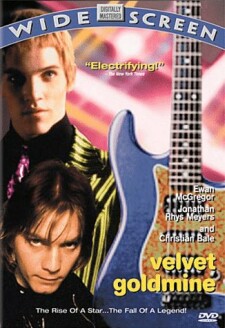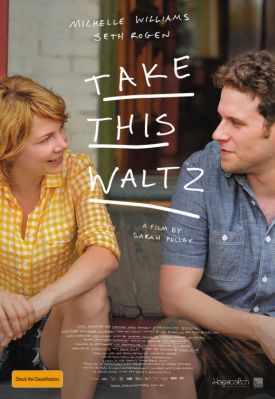Blue is the Warmest Color (La vie d’Adèle)
One of my favorite recent Guardian headlines — right up there alongside “Why do normal men turn sexist when they get in front of a barbecue?” or “Snowden’s revelations must not blind us to government as a force for good” — is this one, to an article by Nick Dastoor: “A single man’s guide to seeing Blue Is the Warmest Color.” As self-parody, that could have topped even Julie Bindel’s “What straight men don’t understand about lesbians” of a couple of years previous except that, unlike her piece, Mr Dastoor’s turned out to have been a deliberate self-parody. I find that a hopeful sign. If even the unfailingly p.c. Guardian can recognize something of the absurdity in the political controversy surrounding Abdellatif Kechiche’s Palme d’Or-winning movie — which, by the way, the Guardian’s critic absolutely loved — then maybe the islands of sanity in the sea of Media Madness are larger and more accommodating than I have hitherto supposed.
Unfortunately, that doesn’t mean we can quite ignore the controversy or the politics in order to look at this very pretty and well-made movie as “just” a movie. No more can Mr Kechiche successfully renounce his or his camera’s “male gaze” at the naked bodies of two remarkably attractive young women who are apparently not lesbians in real life but are pretending to be lesbians in the movie. Or, rather, they are pretending to be what he, or they, or even certain authoritative lesbians themselves must imagine “authentic” lesbians to be. A certain uneasiness on this point was doubtless what led the jury at Cannes, presided over by Steven Spielberg, to award the top prize not just to the director but also to the two young women in question, Léa Seydoux and Adèle Exarchopoulos, both of whom have since criticized Mr Kechiche for mistreating or exploiting them. That criticism is also, I suspect, at least partly politically motivated, since it forestalls any censure of themselves for acting like sexual performing seals at the bidding of a man with a camera.
The point is that, just as there is (so everyone seems to assume) a politically correct way of being a lesbian, so there is of looking at one, let alone two. It follows that there must also be politically incorrect ways, and lots of people are saying that Mr Kechiche has fallen into them. Not just Blue is the Warmest Color but any representation of lesbianism or lesbian sex must therefore take into account its political dimension. That’s why the movie is not separable from its own political purpose, which I take to be more or less the same as that of Ang Lee in Brokeback Mountain — namely, the promotion of the liberal view that homosexual love differs in no important respect, least of all morally, from the heterosexual kind. Gay people, both directors mean to tell us, are just like us, their presumptively heterosexual audience, even if they are only ambiguously or uncertainly gay or (as they say) bisexual. Erotic love is always the same, regardless of its object, and we along with the director can congratulate ourselves for our tolerance and liberal-mindedness in thinking so. Plus, with Blue, we get some hot girl-on-girl action as well.
I remain determinedly agnostic about the central premiss of the two films, though I found it less persuasive in Brokeback than I did in Blue — perhaps because of the porny touch to the latter which the former (for some reason) thought unnecessary or undesirable. Naturally, too, I find it easier to put myself imaginatively in the place of either of the two women than I do in that of either of the two men. But I wonder if the political intent implied in the effort doesn’t rather undermine itself? For insofar as we are successful in forgetting that the relationship is same-sex and see it only as a generic love-story we lose some of the particularity which is a necessary component of any good love-story. In other words, we have to believe that the two lovers are (as it were) fated to be together because of the particular people they are — which naturally includes their sex — and not just because they are gratifying an appetite with the most convenient partner of the moment. Sex in the old-fashioned romance became acceptable because it wasn’t about sex but a transcendental union of souls with an eternal dimension. Take that away and you are left with banality and soap opera.
There are signs that Mr Kechiche recognizes this in his story-telling, since he avoids linearity and instead provides us with unconnected vignettes of the lovers at various stages of their relationship over a period of several years. As many of these are emotionally affecting as are sexually titillating. By thus leaving out any account of the practicalities, the day-to-dayness of getting from a to b to c and keeping us focused instead on the relationship’s most passionate or otherwise significant moments he is able to keep at bay the feeling that it doesn’t, ultimately, matter very much, however fine or lasting the two women’s memories of their togetherness. In this respect, the movie lacks a little the courage of its own convictions in a way that Brokeback Mountain, where fatality and irrevocability are never far out of sight, does not.
But, predicated of two women, the classic love story has another political dimension, since the idea of fated love is itself fatally tainted — so Manohla Dargis tells us — with the myth of the “eternal feminine,” which has historically been a part of the transcendental approach to romantic love but is obviously a big no-no from the feminist point of view. Banality is just what the movie’s critics seem to be insisting on by rejecting the male gaze and, paradoxically, continuing to reserve the mysteries of female sexuality to themselves. The mystery now, apparently, is that there is no mystery, at least not one which can survive exhibition to a general audience. It’s just sex, folks. Nothing to see here. It’s an interesting idea but the attempt to accommodate it doesn’t make for a very interesting movie.
Discover more from James Bowman
Subscribe to get the latest posts to your email.

